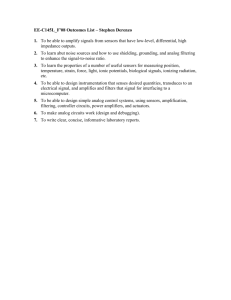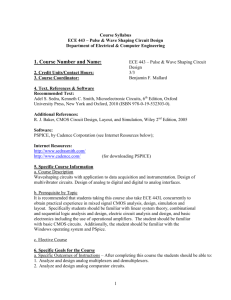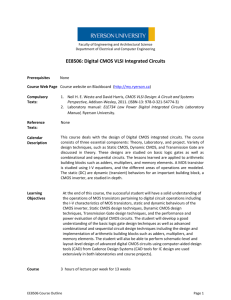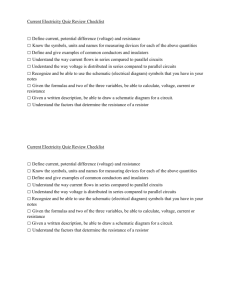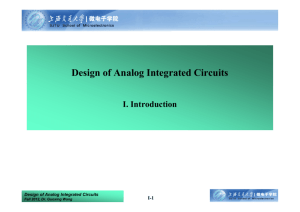Outline - Ryerson Electrical & Computer Engineering
advertisement
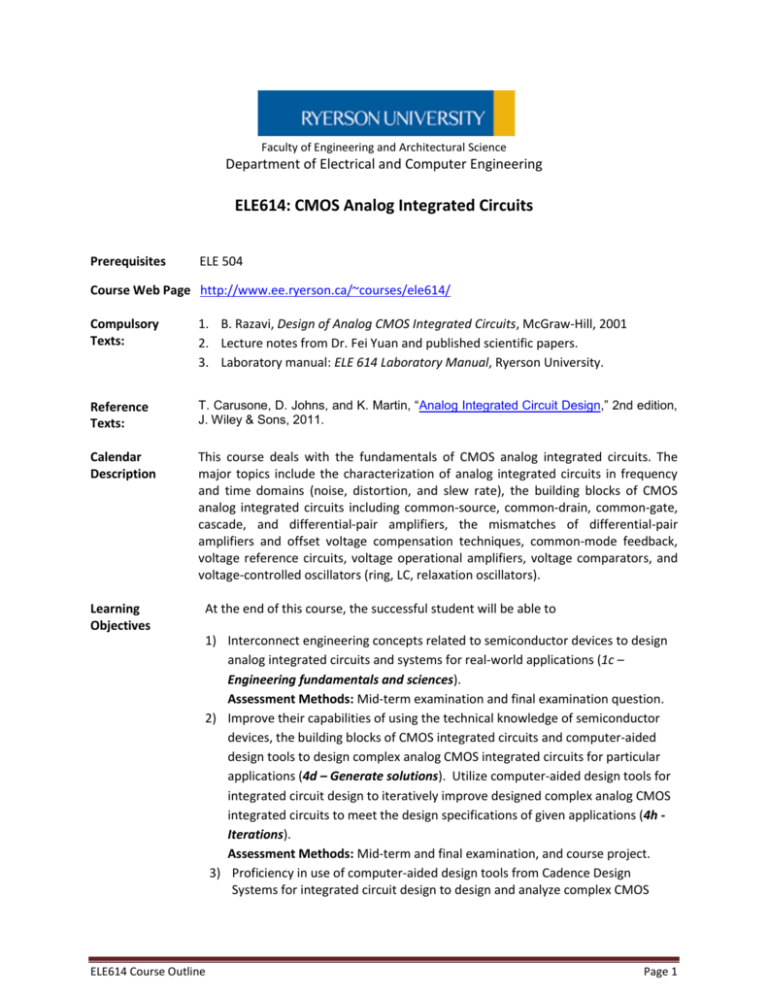
Faculty of Engineering and Architectural Science Department of Electrical and Computer Engineering ELE614: CMOS Analog Integrated Circuits Prerequisites ELE 504 Course Web Page http://www.ee.ryerson.ca/~courses/ele614/ Compulsory Texts: 1. B. Razavi, Design of Analog CMOS Integrated Circuits, McGraw-Hill, 2001 2. Lecture notes from Dr. Fei Yuan and published scientific papers. 3. Laboratory manual: ELE 614 Laboratory Manual, Ryerson University. Reference Texts: T. Carusone, D. Johns, and K. Martin, “Analog Integrated Circuit Design,” 2nd edition, J. Wiley & Sons, 2011. Calendar Description This course deals with the fundamentals of CMOS analog integrated circuits. The major topics include the characterization of analog integrated circuits in frequency and time domains (noise, distortion, and slew rate), the building blocks of CMOS analog integrated circuits including common-source, common-drain, common-gate, cascade, and differential-pair amplifiers, the mismatches of differential-pair amplifiers and offset voltage compensation techniques, common-mode feedback, voltage reference circuits, voltage operational amplifiers, voltage comparators, and voltage-controlled oscillators (ring, LC, relaxation oscillators). Learning Objectives At the end of this course, the successful student will be able to 1) Interconnect engineering concepts related to semiconductor devices to design analog integrated circuits and systems for real-world applications (1c – Engineering fundamentals and sciences). Assessment Methods: Mid-term examination and final examination question. 2) Improve their capabilities of using the technical knowledge of semiconductor devices, the building blocks of CMOS integrated circuits and computer-aided design tools to design complex analog CMOS integrated circuits for particular applications (4d – Generate solutions). Utilize computer-aided design tools for integrated circuit design to iteratively improve designed complex analog CMOS integrated circuits to meet the design specifications of given applications (4h Iterations). Assessment Methods: Mid-term and final examination, and course project. 3) Proficiency in use of computer-aided design tools from Cadence Design Systems for integrated circuit design to design and analyze complex CMOS ELE614 Course Outline Page 1 analog integrated circuits. (5c – Use of engineering tools) Assessment Methods: Laboratories and course project using computer-aided design tools from Cadence design systems. 4) Write professionally prepared laboratory reports in confirmation to IEEE format. Laboratory reports are evaluated on their correctness, completeness, English, and quality of graphics (7a – Written, 7d - Graphical) Assessment Methods: professionally prepared laboratory reports. Note: Numbers in parentheses refer to the graduate attributes required by the Canadian Engineering Accreditation Board. For more information, see: http://www.feas.ryerson.ca/quality_assurance/accreditation.pdf Course Organization 3 hours of lecture per week for 13 weeks 2 hours of lab per week for 12 weeks Course Evaluation Labs Midterm exam Quiz 1 Quiz 2 Final exam Total 30% 20% 10% 10% 30% 100% To achieve a passing grade, student must pass the theory components (Mid-term and Final examinations) of the course. Examinations Midterm examination is a 1.5-hour, closed-book examination that covers all the lecture and laboratory materials up to the week immediately before the mid-term examination. Final examination is a 3-hour closed-book examination that covers all the course material and laboratory materials. Course Content Week Detailed Description 1-3 Building Blocks of CMOS Analog Circuits 1) Review of operation of MOSFETs 2) Common-source, common-drain, and common-gate configurations 3) Cascode configurations 4) Differential configurations 4-5 Voltage Amplifiers 1) Common-mode feedback 2) Offset compensation techniques 3) Gain boosting techniques 4) Bandwidth enhancement techniques 6-7 Layout techniques for MOS devices ELE614 Course Outline Hours 9 6 6 Page 2 1) MOS transistors 2) MOS, Diffusion, and poly resistors 3) Diffusion, MOS, and MIM capacitors 4) Spiral inductors 5) Latch-up 8 Voltage Comparators 1) Schmitt triggers 2) Voltage comparators 9-10 Voltage and Current References 1) Temperature sensing MOS elements 2) Voltage reference circuits 11-13 Voltage-Controlled Oscillators 1) Ring oscillators 2) LC tank oscillators 3) Relaxation oscillators 4) Colpitts oscillators 3 6 9 Laboratory/Projects Labs. 0 1 2 3 4 5 Detailed Description Cadence tutorial 3-stage amplifier part 1 – Differential common-source input stage 3-stage amplifier part 2 – Differential cascade input stage 3-stage amplifier part 3 – Differential cascade input stage with commonmode feedback and input offset voltage compensation 3-stage amplifier part 4 – complete differential cascade amplifier with common-mode feedback and input offset voltage compensation 3-stage amplifier part 5 – Layout of differential cascade amplifier No. of weeks 1 2 1 2 2 3 Note: Schedule of lectures and labs is tentative. There may be some changes in the schedule that will be announced in the class and posted on course website. Important Notes 1. All of the required course-specific written reports will be assessed not only on their technical/academic merit, but also on the communication skills exhibited through these reports. 2. All assignment and lab/tutorial reports must have the standard cover page which can be completed and printed from the Department website at www.ee.ryerson.ca. The cover page must be signed by the student(s) prior to submission of the work. Submissions without the cover pages will not be accepted. 3. Should a student miss a mid-term test or equivalent (e.g. studio or presentation), with appropriate documentation, a make-up will be scheduled as soon as possible in the same semester. Make-ups should cover the same material as the original assessment but need not be of an identical format. Only if it is not possible to schedule such a make-up may the weight of the missed work be placed on the final exam, or another single assessment. This may not cause that exam or assessment to be worth more than 70% of the student’s final grade. If a student misses a scheduled make-up test or exam, the grade may be distributed over other course assessments even if that makes the grade on the final exam worth more than 70% of the final grade in the course. ELE614 Course Outline Page 3 4. 5. 6. 7. 8. 9. 10. 11. 12. 13. Students who miss a final exam for a verifiable reason and who cannot be given a make-up exam prior to the submission of final course grades, must be given a grade of INC (as outlined in the Grading Promotion and Academic Standing Policy) and a make-up exam (normally within 2 weeks of the beginning of the next semester) that carries the same weight and measures the same knowledge, must be scheduled. Medical or Compassionate documents for the missing of an exam must be submitted within 3 working days of the exam. Students are responsible for notifying the instructor that they will be missing an exam as soon as possible. Requests for accommodation of specific religious or spiritual observance must be presented to the instructor no later than two weeks prior to the conflict in question (in the case of final examinations within two weeks of the release of the examination schedule). In extenuating circumstances this deadline may be extended. If the dates are not known well in advance because they are linked to other conditions, requests should be submitted as soon as possible in advance of the required observance. Given that timely requests will prevent difficulties with arranging constructive accommodations, students are strongly encouraged to notify the instructor of an observance accommodation issue within the first two weeks of classes. The results of the first test or mid-term exam will be returned to students before the deadline to drop an undergraduate course in good Academic Standing. Students are required to adhere to all relevant University policies including: Undergraduate Grading, Promotion and Academic Standing, http://www.ryerson.ca/senate/policies/pol46.pdf Student Code of Academic Conduct, http://www.ryerson.ca/senate/policies/pol60.pdf Student Code of Non-Academic Conduct, http://www.ryerson.ca/senate/policies/pol61.pdf Undergraduate Academic Consideration and Appeals, http://www.ryerson.ca/senate/policies/pol134.pdf Examination Policy, http://www.ryerson.ca/senate/policies/pol135.pdf Accom. of Student Relig., Abor. and Spir. Observance, http://www.ryerson.ca/senate/policies/pol150.pdf Est. of Stud. Email Accts for Official Univ. Commun., http://www.ryerson.ca/senate/policies/pol157.pdf Students are required to obtain and maintain a Ryerson Matrix e-mail account for timely communications between the instructor and the students. Any changes in the course outline, test dates, marking or evaluation will be discussed in class prior to being implemented. In-class use of cellular telephones is not permitted. Please turn off your cell phone prior to class. Quiet use of laptops, text-messengers and similar non-audible devices are permitted only in the rear rows of the class. This restriction allows use of such devices by their users while limiting audible and visual distractions to other students. This policy may change without notice. Labs, projects handed in past the due date and time will not be accepted for marking and will receive a mark of ZERO. In some genuine cases late submission will be allowed with a penalty of 5% per day. Students found to have plagiarized any portion of their labs and final project will receive a grade of zero on the complete project. This automatically will lead to a failing grade Instructor _______________________________ Date ________________________________ Approved by _______________________________ Program Director /Chair Date ________________________________ ELE614 Course Outline Page 4
